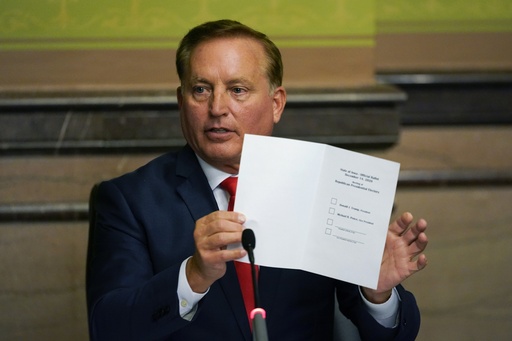DES MOINES, Iowa — On Tuesday, the state of Iowa initiated legal proceedings against the Biden administration, seeking access to citizenship information regarding over 2,000 registered voters it questions as the 2024 elections approach.
The lawsuit outlines a series of communications between state election officials and the federal government. This followed a review of voter registration lists against those who had declared themselves noncitizens with the Iowa Department of Transportation. Out of the 2,176 individuals identified, many had subsequently registered to vote or already cast their ballots, raising the possibility that some might have acquired citizenship since their initial status was recorded.
According to the lawsuit, Iowa Secretary of State Paul Pate’s office requested details from the U.S. Department of Homeland Security (DHS) concerning the citizenship status of these individuals but received no response. Pate, alongside Attorney General Brenna Bird, expressed in a joint statement that the lack of federal cooperation forced the state to rely on less-than-ideal data to prevent any legal votes from being overshadowed by those potentially cast by noncitizens.
A spokesperson from DHS stated that while the agency does not comment on ongoing litigation, U.S. Citizenship and Immigration Services has been in communication with Iowa and intends to maintain this dialogue through proper channels.
With early voting already in progress, Pate advised county election officials to challenge ballots cast by individuals listed as noncitizens and instead allow them to vote provisionally. This prompted the American Civil Liberties Union (ACLU) of Iowa to file a lawsuit against Pate on October 30, representing four naturalized voters included on the list. They contested the reliability of the DOT’s information and accused Pate of infringing upon their voting rights. A federal judge ultimately denied their request to halt the ballot challenges on November 3.
Voting in federal elections is restricted to U.S. citizens, but there is scant evidence indicating widespread incidences of noncitizen voting. Nonetheless, Iowa and several other states claim to have pinpointed multiple cases. Some individuals had registered or voted before declaring noncitizen status to the DOT, prompting Pate’s office to refer their information to law enforcement agencies for investigation and potential prosecution. Critics of Pate argue that even these cases might involve mistaken identification as noncitizens due to the questionable reliability of the DOT data.
In their statement, the ACLU and its Iowa branch suggested that the federal government would provide the necessary information if it was assured that it would not be misused by the state.
“Research, journalistic inquiries, and various attempts by government officials at both state and national levels have shown that non-citizen voting is extremely rare,” the statement noted. “This unnecessary lawsuit will not alter that fact. It would be more beneficial for state leaders to tackle real issues affecting Iowa.”
Pate’s office has not disclosed how many individuals eventually proved their citizenship or how many ballots were contested. However, preliminary reports from 97 of Iowa’s 99 counties indicated that at least 500 individuals verified their citizenship and had their votes counted. Additionally, the Register reported that 74 ballots were rejected, predominantly because the individuals failed to verify their citizenship status.
According to the data compiled, most of those identified in Pate’s inquiry did not participate in the 2024 election. Concerns regarding the integrity of elections in relation to noncitizen voting have been reiterated in this election cycle by political figures such as President-elect Donald Trump and other Republican leaders, despite the rarity of such voting occurrences in the U.S.
Unlike Virginia, which has seen over 1,600 voters removed from registration lists via an executive order from Republican Governor Glenn Youngkin, Iowa has not purged any voters. The U.S. Justice Department, alongside various private organizations, has initiated legal action against Virginia, asserting that state officials breached federal laws regarding the 90-day quiet period surrounding elections. The U.S. Supreme Court’s conservative majority permitted Virginia to continue its action.
As the November 5 elections draw near, Pate emphasized that the information from the DOT was the only reliable list at their disposal without access to federal immigration records. “We strive to balance this process,” he said. “We want everyone eligible to vote. That’s why no one has been removed from the electoral rolls. However, we have a responsibility to ensure that they are indeed citizens.”



